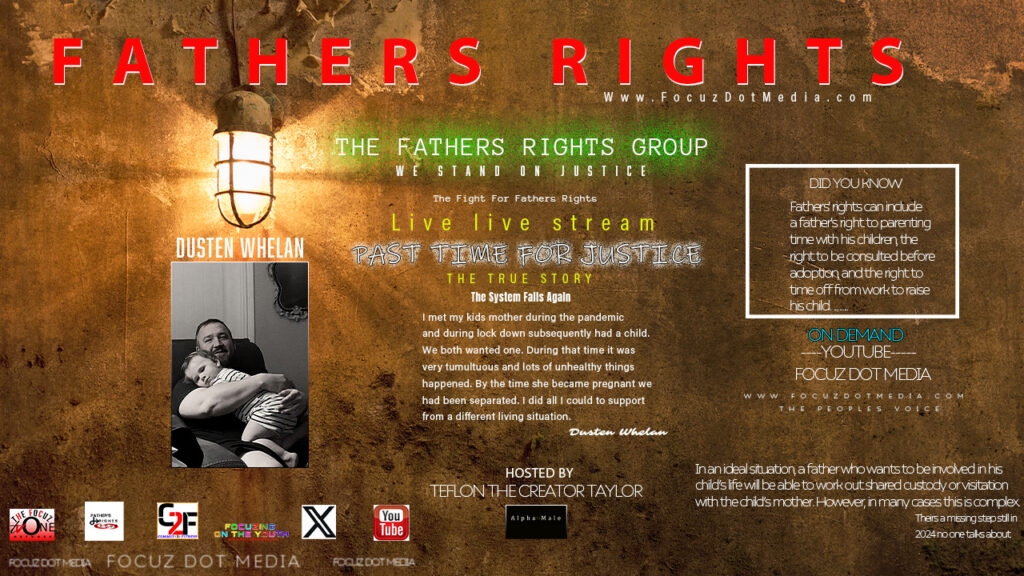

WHEN IT MATTERS CONTACT US
INFO@FOCUZDOTMEDIA.COM
Att: Fathers Rights Group
Explore the Focuz TV One Network for live interviews discussing fathers’ rights. Stay connected and informed with thought-provoking discussions.

Dusten Whelan Story
Discover the Dusten Whelan story on Fathers’ Rights, hosted by Teflon Taylor. Stand with us in the pursuit of justice for fathers everywhere. Fathers’ Rights the fight for justice, The Dusten Whelan story. We fight for justice and equality for fathers in our society.


Affordable Fathers Rights Lawyer
in Denver, CO
Affordable Legal Access For All
When you need legal help, Legal Shield is here. Our network of experienced lawyers can provide advice on legal issues for you, your family, or your business, all directly through our app. With no hourly fee or retainer, we help you worry less and live more. What are you waiting for? Join now and speak with a lawyer in as little as 4 hours after initial contact.
Discover the power of digital media with FOCUZ DOT MEDIA. Our services include web design, SEO, and social media marketing. Let us help you reach your online goals effectively.


Fathers‘ rights can include a father’s right to parenting time with his children, the right to be consulted before adoption, and the right to time off from work to raise his child. FindLaw’s Fathers’ Rights section has the information you need to understand a father’s rights in relation to his children.
FindLaw’s Fathers’ Rights section has the information you need to understand a father’s rights in relation to his children. In this section, you’ll find in-depth articles on fathers’ rights, covering topics such as parenting time and the consequences of parenting time interference, fathers’ rights before birth and in family planning decisions, and the right to information regarding one’s child. You can also learn about the fathers’ rights movement, proposals for family law reform, and notable fathers’ rights legal cases.

Fathers’ Rights and Family Planning
When it comes to family planning, decisions about abortion, adoption, and raising a child can have long-lasting implications for both parents. If a parent is considering putting a child up for adoption, the father has the right to object and petition for custody of the child.
An expectant father who opposes the termination of a pregnancy has generally had no legal right to prevent it. Under the U.S. Supreme Court’s ruling in Roe v. Wade (1973), the decision to terminate a pregnancy prior to viability was seen as a constitutional privacy right of the woman. Prior state regulations that sought to require a husband’s consent to abortion were struck down. In Dobbs v. Jackson Women’s Health Organization (2022), the Court overturned its ruling in Roe. This means a woman’s privacy rights in the abortion decision are now left to state law. The rights of a potential father prior to a child’s birth may vary from state to state.
Current laws do not allow a father to avoid child support on the basis that he opposed the birth of the child. Public policy reinforces the view that a child should benefit from the financial support of both parents. Some advocates of greater fathers’ rights have argued that fathers should have the right to “disclaim fatherhood” and refuse financial or legal responsibility for a child born against their wishes. This remains a controversial stance.
Fathers’ Rights to Parental Leave
Research has shown that the entire family benefits when a father takes time off when a new child arrives. To make it easier for parents to bond with their new child, the federal Family and Medical Leave Act allows for twelve weeks of unpaid leave for certain workers when a child is born or adopted. Several states also may provide for paid paternal and maternal leave. Paid leave can help mitigate the cost of leaving work to care for a child. These policies promote a child’s early development and well-being.
Fathers’ Rights to Child Custody and Parenting Time
Both parents have the right to seek custody and parenting time with their child. A divorcing father may seek joint or shared custody before the family court. An unmarried father may establish paternity and then seek custody rights in court.
In shared custody arrangements, both parents share decision-making responsibility for the child and often split parenting time more equally. Several states presume that shared custody is in the best interests of a child unless there is a history of domestic violence. Parents often cooperate and enter into a shared parenting plan which then becomes part of the court order. Fathers may see a shared parenting plan as a way to preserve equal rights for the parents in the child’s life. This may be the case even if the parenting time schedule does not provide for equal time. Child support payments may see adjustments based on the amount of parenting time the paying parent has with the child.
When the court awards sole custody, one parent gains legal custody and primary physical custody regarding the child. Legal custody includes the right to make health care, school-related, and other important decisions for the child. Primary physical custody means that the child resides in your home the majority of the time. In a custody case with sole custody, the non-custodial parent gains visitation rights or parenting time. The child support order will order the non-custodial parent to pay the custodial parent support based on the state guidelines.
Many parenting advocates argue that children are better served when both parents play a large role in their lives, whether they share legal custody or not. If the parents do not reach an agreement on custody and parenting time, then the court will issue a ruling and set the custody order. The court must review the evidence in light of the best interests of the child.
Parenting Time Interference
A parenting time agreement is often adopted by a court during a divorce or custody case. If the parties do not agree, then the court will set the final order on such matters. In either case, the final court order establishes each parent’s right to custody and parenting time with their child.
While raising a child in two households, a parent may interfere with the other parent’s parenting time. For example, parents have an order that provides alternating weekend parenting time. The child’s mother schedules events with her extended family on the father’s weekend and requests that the father “give up” his time. In such a situation, the father may permit the child to attend the mother’s family event. The father could also refuse. The father could offer to swap time on the schedule with the child’s mother. If the parents work out an arrangement, they must address transportation, the new times for transferring the child back to the father, and other matters. If they do not agree, there may be bitterness in one household or the other. If the mother keeps the child against the father’s wishes, this may be a case of parenting time interference.
Parenting time interference can be direct, as in keeping a child during the other parent’s time. It could be refusing to drop one’s son or daughter off with the other parent. Interference can also be more subtle and indirect. It may appear as purposefully disrupting communication between the child and the other parent. A parent may use the child to spy on the other parent and report back. In extreme cases, parenting time interference can result in a denial of parenting time for long periods. It may show up in malicious or alienating acts by one parent against the other.
BEFORE AND AFTER
< DONT LET THE COURTS TAKE CONTROL >






 Sofia Llamas: A Force for Good in Colorado – Igniting Hope and Empowering Communities
Sofia Llamas: A Force for Good in Colorado – Igniting Hope and Empowering Communities  Trump administration offers to pay plane tickets, give stipend to self-deporting immigrants
Trump administration offers to pay plane tickets, give stipend to self-deporting immigrants  The Force Awakens: Aiden Anderson’s Rise in Dallas Amateur Boxing
The Force Awakens: Aiden Anderson’s Rise in Dallas Amateur Boxing  Thomas Edward Patrick Brady Jr, Shedeur Sanders, Travis Hunter, Shilo Sanders, Jimmy Horn Jr, Global Don, and more
Thomas Edward Patrick Brady Jr, Shedeur Sanders, Travis Hunter, Shilo Sanders, Jimmy Horn Jr, Global Don, and more